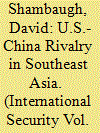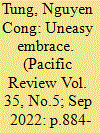|
|
|
Sort Order |
|
|
|
Items / Page
|
|
|
|
|
|
|
| Srl | Item |
| 1 |
ID:
191827


|
|
|
|
|
| Summary/Abstract |
The AUKUS agreement to facilitate Australia's acquisition of nuclear-powered submarines has been described by its critics as a ‘bet' on the U.S. This bet entails serious risks for Australia. These risks include uncertainty around construction of the submarines; uncertainty around the U.S.'s long-term commitment to the region; and uncertainty about the future political trajectory of the U.S. These risks are compounded by the sovereignty-constraining implications of AUKUS. The reliance on U.S. technical expertise, and the demands of military interoperability, will bind Australian defence policy more closely to the U.S. than ever. Hence, AUKUS is a deal that demands close scrutiny. This article contributes to such scrutiny, exploring the risks associated with this bet on the U.S. In particular, it examines the ‘America’ that Australian governments expressly want – a liberal internationalist America with a strong commitment to democracy – and then contrasts this with the America that Australia does not want but may well get: an illiberal America that is increasingly anti-democratic at home and crudely transactional, protectionist and undiplomatic abroad. The obvious problem with this approach, we argue, is that Australia does not get to choose the presidential administration in the U.S. over the next twenty to forty years.
|
|
|
|
|
|
|
|
|
|
|
|
|
|
|
|
| 2 |
ID:
159474


|
|
|
|
|
| Summary/Abstract |
U.S.-China comprehensive competition is currently playing out on an increasingly global scale. The competition's primary locus is the vast Indo-Asia-Pacific region, and it is centered in Southeast Asia. The United States and China each possess comparative advantages in the region. Beijing's advantages are predominantly economic and diplomatic, whereas Washington's are more multifaceted. Although the Barack Obama administration's “pivot” significantly raised the U.S profile in Southeast Asia, China has also expanded its presence and influence. The two powers are increasingly locked in a classic strategic competition, but the pervasive media narrative in the region holds that China is gaining the upper hand. While this gravitation toward Beijing has become a popular meme, it is not empirically accurate—as the United States still possesses substantial overall advantages. Still, the regional balance is dynamic, and the United States needs to remain comprehensively engaged—or else the balance of influence will default to China. At present, the Sino-American competition in Southeast Asia is not (yet) acute and zero-sum. Therefore, the two powers should be able to manage their tensions, limit their rivalry, and practice competitive coexistence.
|
|
|
|
|
|
|
|
|
|
|
|
|
|
|
|
| 3 |
ID:
189254


|
|
|
|
|
| Summary/Abstract |
Like many other small and middle powers, Vietnam is facing a strategic dilemma in the face of the U.S.-China rivalry. With the introduction of a vision for Free and Open Indo-Pacific (FOIP), the US seeks to strengthen ties with its allies and partners in the region to preserve rules-based international order and to counter China’s rise. Being positioned as the U.S. burgeoning like-minded partner in the regional security architecture, how Vietnam responds to the FOIP strategy, hence, merits consideration. This article argues that Vietnam has responded positively toward the FOIP strategy due to the high compatibility between some key tenets of this strategy and its national interests. However, rather than joining and supporting FOIP in a full-fledged way, Vietnam has chosen to work selectively in some issues with the US. More specifically, while Vietnam proactively embraces the economic dimension in FOIP, it still remains cautious about the security domain. The rationale behind Vietnam’s hesitation to lend full support to this strategy is partially driven by China factor. In this article, China is addressed as a “brake,” which can exert influence on the speed and scope of cooperation that Vietnam is willing to move forward with the US under FOIP strategy.
|
|
|
|
|
|
|
|
|
|
|
|
|
|
|
|
|
|
|
|
|